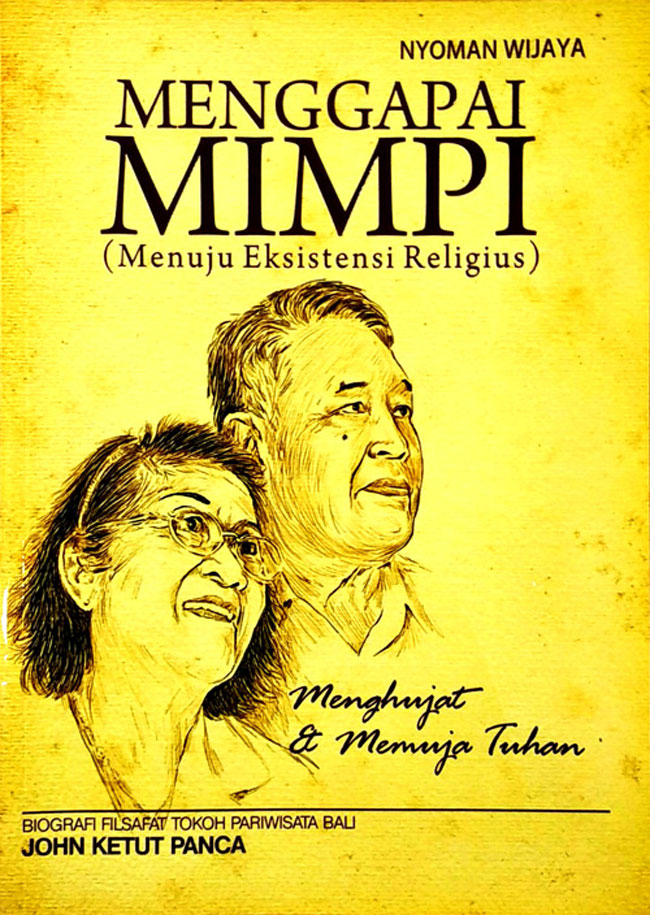
Reaching Dreams (Towards Religious Existence) Blaspheming and Adoring God: Biography of the Philosophy of Bali Tourism Figure John Ketut Panca
Nyoman Wijaya
ISBN : 978-602-1586-42-6 Published : 2015
Abstrak
Budiono Kusumohamijoyo in his book titled Classical Greek Philosophy Relevance for the present [2012] says, defining philosophy is merely a 'science for realizing love for wisdom,' is a naïve understanding. Philosophers who pursue philosophy in that way are exactly like an intelligent, kind, and diligent person, but work in ivory towers that were never erected.
Yet over time philosophy has experienced a development of meaning. Philosophy is a science, but not just any knowledge, but a science that is interpreted. Philosophy is also a process. Therefore, philosophy is more a struggle of thought in order to get as clear an explanation as possible. And also gain a deep understanding of all the basic problems, both those which can or may not be questioned by humans.
Still according to Kusumohamijoyo, as a science, 'the aim of philosophy is to deal with the most important questions' which are outside the methodical ability of scientific knowledge, especially methodically, systematically, critically, and fundamentally; in short, architecturally and responsibly. That was what was originally done by the Ancient Greek philosophers. They are not interested in complicating what is clear, but instead trying to explain what is generally considered to be clear by most people, when in fact it is not clear.
But as Kusumohamijoyo said, there is no point in studying and deepening the history of philosophy without rediscovering and drawing actual relevance in the present. It is very unfortunate if the actual relevance of philosophy cannot be drawn, because in fact ancient Greek philosophy contains a great deal of wisdom, such as the 'truth', many of which are still valid today. Even world civilization today relies heavily on the postulates which were originally outlined by thinkers of ancient Greece.
Based on the opinion of the philosopher, in this book I try to pluck the arguments of philosophers about humans and try to find the actual relevance in the present. Because of that as a historian, I enforce the philosophical arguments of the philosopher, just as I use social science theories to answer an introgative question, why an event occurs. One thing that I hold, these theories will not be used to force the data to want to talk. On the contrary, I let the data speak for themselves, walking alone using social theories as a guide. If a theory cannot or is not suitable as a data guide, then I will look for a replacement.
Therefore, in writing this book I need an individual and then formulate the problems of his life by asking questions how and why those problems arise. Certainly not just any individual who can be used as a research subject. There are several conditions that must be met. He must be the people I know his life history can qualify for the purposes of this writing. The more important requirement is that he must be relatively honest, not cover up the good and bad experiences of his life.
The individual who, according to my subjective view, deserves to be the subject of research is John Ketut Panca, whom I usually call JKP. I have known JKP since 2000 and explored his life history through a biography. Compared to other figures I know, JKP is a unique person. Especially because honesty tells the story of his life, which is associated with something in the language of philosophy called the existence of the aesthetic stage. It can be said that JKP relatively has nothing to hide when invited to talk about life experiences related to the fulfillment of all worldly pleasures and pleasures.
The JKP that I used to know was profane [worldly] in his old age, I saw beginning to lead to religious thoughts and actions. He no longer allowed himself to be controlled by his personal will and direct pleasure. He began to open up to something more universal patterned, including those contained in Christian teachings. This was done by providing assistance such as counseling to his friends who were experiencing psychological problems and some were even mystical.
The problem is how to convey the idea to JKP, because relatively many books have been written about him. For a long time the idea was stagnant, I even briefly expressed it when in my preface to the book God is Everything: A Biography of the Life Theology of John Ketut Pantja by Victorius A. Hamel (2010). Finally the opportunity was there.
Finally, I hope this book can be used as learning material for anyone interested in studying philosophy in its actuality in human life today. But there is still much that I need to study, especially the deepening of the postulates of philosophy, to be able to actually call this book a philosophy biography.
